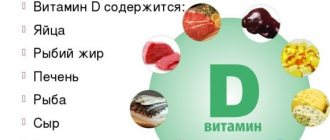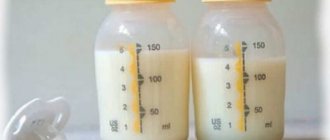The essence of the process
What is breast milk burnout? Of course, literally milk cannot burn out, as it seems. A woman's breast milk volume first decreases, then it disappears completely, thereby ending lactation.
See also:
How to properly switch from breastfeeding to formula. Termination of lactation
How to reduce breast milk lactation for a nursing motherCessation of lactation
Modern anti-lactation pillsCessation of lactation
In medicine, the process of stopping milk production, namely burnout, is called acute mastitis. Often the disease is accompanied by fever and the discharge of ichor from the nipples. Women popularly mean by burnout the cessation of lactation after the birth of a child, accompanied by painful sensations.
Causes of milk burnout
There are situations when lactation ends naturally, but it also happens that the cessation of milk production is preceded by certain reasons that work to ensure that breast milk burns out:
- Stress that provokes unpleasant moral sensations
- Accompanying illnesses
- Errors in nutrition
- Taking medications
- Stopping milk production on your own
Only a doctor can understand what exactly affected lactation and led to its stop and how long it takes for breast milk to burn out. Let's look at each option in more detail.
Myths about why breast milk can burn out?
Now let’s go back to our days and discuss what exactly modern women mean by the concept of “burnt out”. What is this process identified with, and what is true and what is not?
There are three common reasons associated with the disappearance of milk:
- physical illness;
- frayed nerves (in other words, stress);
- the milk has spoiled.
Often, illness, or more precisely, the temperature with which it is accompanied, is blamed for a decrease in breast milk. But that's not true.
Milk burnout due to illness
Even a common virus or cold can cause milk production to stop. The fact is that during a significant rise in body temperature, the body consumes more moisture from the body to restore normal thermoregulation. Thus, breast milk, which consists of more than 90% water, also suffers.
It is worth saying that the virus itself is not dangerous, therefore, during illness, leading pediatricians, led by Evgeniy Komarovsky, recommend not to stop breastfeeding the baby. This will ensure that the child receives the necessary antibodies and strengthens his immunity.
Thus, in order to maintain lactation during illness, you should adhere to the following rules:
- Do not stop putting your baby to the breast, despite the general condition
- Drink as much fluid as you like to stay hydrated
However, it is worth saying that these rules do not apply in the case of diseases caused by pathogenic bacteria that require the use of antibacterial agents.
Your body will take care of the remaining milk
Ever wondered what happens to your milk after you stop breastfeeding? Although many people adhere to the term “disappearing,” the reality is somewhat different. Lee Ann O'Connor, a professional lactation consultant, explained the process to Romper. First, milk continues to be produced as always. When this happens and you stop breastfeeding or expressing milk, the body tells the brain that milk is no longer needed, causing milk production to stop. "The milk is then absorbed by the body," O'Connor says.
Smooth and fresh skin: dermaplaning, or why a woman needs to shave her face
Rare shot: Viktoria Isakova showed her grown-up daughter from Yuri Moroz (new photo)
It’s good to wash often: myths about shampoo and hair care that only harm
Absorption is actually a rather complex but interesting process. Diana West, a professional lactation consultant and director of media relations for La Leche League, a nonprofit organization for breastfeeding issues, spoke at length about the process to Fox News. She explained that the cells initially responsible for milk production subsequently begin to destroy it. Yes, women's breasts have truly magical powers.
Lactation stopped due to stress
There is an opinion that stress, or rather its effect on the body, can stop lactation. This is not entirely true; it is literally impossible to say that the milk has burnt out. This is explained as follows:
- Stress does not affect the production of prolactin, which is responsible for lactation. For this reason, stress cannot change a woman’s hormonal levels.
- Due to stress, the production of oxytocin may decrease, which may lead to stagnation of breast milk in the ducts. As you know, the thicker the milk, the more difficult it is for the baby to suck the nipple.
What to do to prevent stress from affecting the quality of lactation:
- You should not reduce the number of feedings; put your baby to the breast as many times as you can, then lactation will be abundant
- Try to maintain the production of oxytocin by consuming enough fluids, as well as performing a simple breast massage with a towel.
Natural cessation of lactation
The spontaneous production of breast milk can stop at any time. Milk begins to burn out after breastfeeding ends. It is impossible to predict the onset of this process. The same principle applies in the situation when you are the initiator of stopping breastfeeding your baby.
Under what circumstances does lactation end on its own:
- When the child reaches a certain age.
Usually, by the age of 2-3 years, when the baby begins to speak and completely switches to food from the common table, the time comes for weaning from the mother’s breast. And, as you know, the less the baby asks for the breast, the less milk is produced, and over time the milk will burn out completely.
- When breast milk is given to the baby less than once or twice a day
- When mother and baby refused to feed at night.
It often happens that during the day the child does not require the mother’s breast, and this period begins at a fairly early age. However, the situation when the baby does not ask for milk at night means that the milk will soon burn out.
How quickly does milk burn out during natural weaning? Within a week you will be able to feel that milk flows no longer torment you, since prolactin no longer provokes its excess. However, it is too early to talk about complete burnout, since milk will remain in the ducts from one to three months, periodically making itself felt with scanty discharge from the nipples.
Origins of the concept “burnt out”
In the old days, there was a custom to accompany the process of ending breastfeeding with certain actions.
Our distant relatives believed that performing a specific ritual could influence the process of ending breast milk production, which would be easy, quick and painless.
According to these traditions, a woman who finished breastfeeding would pump on a fire or hot stove. As the milk drops evaporated, the milk in the mother's breast should also quickly leave.
It was from these times that the concept of “burnt out” came to us, that is, it disappeared.
Forced termination of lactation
If you decide to stop breastfeeding for one reason or another, you can take advantage of the achievements of modern medicine and take a course of special medications so that the milk burns out. Despite the fact that such tablets can solve the problem quickly and almost painlessly, you should not prescribe the drugs yourself. In order not to harm your health, before drinking them, you should consult a gynecologist and jointly suppress lactation.
Modern medicine is opposed to artificially stopping the production of breast milk. According to many doctors and lactation consultants, taking hormonal pills such as Bromocriptine and others should be supported by good reasons. There are diseases in which stimulating the process of milk burnout is justified, among them the following:
- Brain diseases
- Thyroid pathologies
- Pituitary adenoma
All other diseases are not a direct indication for artificially ending the lactation period and stimulating milk to burn out faster.
What causes milk production to stop?
What should be done to ensure that the process of exiting the lactation period is as painful as possible for a woman? You can follow simple recommendations:
- You need to pump several times a day. First, you need to pump at the time when you usually sat down to feed your baby. Then reduce their number to a minimum, resorting to a breast pump only when the breasts are full and filled with milk
- It is necessary to reduce the amount of liquid consumed. It is advisable to completely avoid fruit and vegetable juices, liquid soups, broths, tea and coffee. Herbal decoctions can be consumed as drinks, and their volume should not exceed 0.5 liters per day, and the temperature of the drink should be room temperature
- If your chest hurts, you need to apply cold compresses 2-3 times a day, applying a wet cloth to the bust.
You should stop pumping after the breasts stop filling and acquire the normal size and shape they had before pregnancy.
It should not be surprising that milk can periodically be released and leave characteristic stains on the underside of the bra. The cause of involuntary milk production can be active caressing of the bust during foreplay to sex or tactile touching your own or someone else’s child. Over time, after a few months, the signs and symptoms of breast milk burnout will go away on their own. Such discharge immediately after the absence of menstruation, or the unpleasant smell of the discharge, should alert you.
Effective folk remedies
Folk methods on how to quickly stop lactation are very popular. Unlike drugs, they act more slowly, but are considered the safest.
We invite you to read: Leo man - how to fall in love and build a relationship
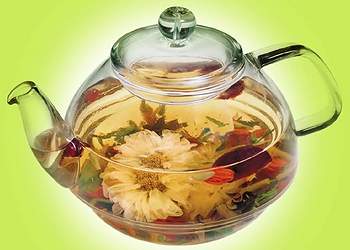
Traditional methods may be safer, but not faster
- It is recommended to use diuretics to stop lactation. The most popular is considered to be a collection of sage and mint. To suppress lactation, you need to pour one tablespoon of crushed sage leaves into a glass of boiling water. You need to insist on it for an hour. Take the resulting solution 4 times a day, 50 ml. Sage not only has a beneficial effect on reducing milk production, but also helps improve women's health.
- Mint helps reduce milk secretion. To prepare the product, 5 teaspoons of mint leaves are steamed in 300 ml of boiling water. The herb should sit for one hour. You need to drink this product by dividing the resulting portion into three times.
- Lingonberry leaf helps effectively. You can include lingonberry tea in your daily diet. It acts as a diuretic. To brew lingonberry leaves, you need to pour 1 tablespoon of the raw material into a glass of boiling water. After half an hour, you can take it 1/3 cup three times a day.
It is important to remember that traditional methods will not help instantly. Most often they are suitable for women who want to gradually wean their baby from the breast. If you need to reduce lactation quickly for medical reasons, this method will not work.
We complete lactation correctly
In order for lactation to end correctly, quickly and painlessly, gynecologists have developed a technique that is followed by mothers all over the world. It consists of six points:
- After deciding to end lactation, do not stop breastfeeding suddenly. This should happen gradually, reduce the number of feedings, eventually reducing them to zero
- In order to completely abandon breastfeeding, it is worth streamlining the number of daytime feedings, giving up morning ones, and only then eliminating feeding at night.
- The optimal age for weaning is from 1.5 to 2.5 years. However, all children are individual; some will be able to switch to a bottle without stress as early as one year, while others will need their mother’s breasts at three years of age. The mother herself must find the most comfortable and acceptable time for artificial milk burnout
- Try to create a fluid deficit in the body
- Help eliminate fluids with gentle physical activity that makes your body sweat
- Do not neglect proven folk remedies that can significantly suppress milk production
Burnout at the end of breastfeeding
When the baby is weaned from the breast, the processes of suppressing lactation are launched. However, it is useless to look for symptoms of how breast milk burns out in this situation. Your body is not a mechanism in which milk production can be turned off “with one button.” Lactation fades gradually, and it is better if you notice these signs before you decide to stop breastfeeding.
With natural completion, involution of lactation (or its suppression) occurs under the following circumstances.
- The child has reached 2.5 years old. When children reach this age, they begin to pay more attention to games and communication than to “mother’s boobs.” A decrease in demand also reduces supply - there is less milk.
- Breastfeeding is a small part of the diet. The child fully eats “adult” food, and asks for breastfeeding only occasionally, 1-2 times a day.
- There are no night feedings. They usually last much longer than during the day. During the day, the baby may not pay any attention to the breast, but at night he literally “hangs” on it. In this situation, natural completion of lactation is impossible, since prolactin production peaks between three and eight o'clock in the morning. Weaning from the breast will be painful for both mother and baby. The possibility of involution will ensure that the child sleeps peacefully in his crib until the morning. And this can only be achieved through pedagogical methods.
If these signs are observed, feeding may be suspended. How many days does breast milk “burn out” in this case? Production will be significantly reduced within five to seven days. But it will remain in the mammary glands for a long time - up to six months.
Natural involution of lactation implies a painless completion of breastfeeding for mother and baby. However, if the separation occurred suddenly, the woman’s breasts may become engorged due to stagnation, causing discomfort and pain.
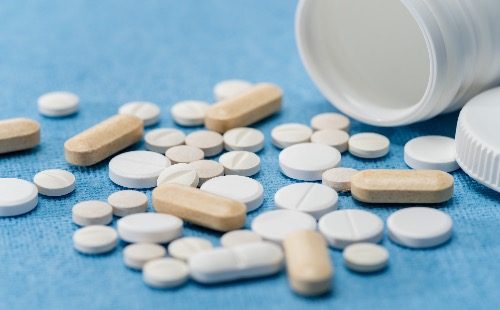
After the pills
Taking medications to suppress lactation quickly reduces milk production. However, lactation consultants point out the dangers of such drugs. According to breastfeeding consultant Natalya Razakhatskaya, it makes sense to use hormonal drugs (Bromocriptine, Dostinex and others) only in exceptional conditions when it is impossible to reduce prolactin levels in any other way.
Such conditions include, for example, a pituitary adenoma, which provides increased levels of prolactin. In other cases, a woman can control the volume of milk production herself, gradually reducing the number of breastfeedings. After the pills, negative consequences often develop (nausea, headaches, fatigue of the woman), plus they do not always help achieve the expected result. And after a two-week course of treatment, breast engorgement returns.
One of the most negative consequences of ending lactation with the help of pills is the prolonged effect. In this case, the drug may inhibit milk production in the next pregnancy.
What not to do
What should you not do to avoid harming yourself? In order for breast milk to burn out faster, you should never resort to breast pulling at home. This may lead to the following problems:
- Mastitis
- Infectious lesions of the mammary glands
This method was used in times when special pharmaceutical preparations did not exist. Now only those women who have little knowledge about the issue of milk burnout can tighten their mammary glands, based on reviews and advice from the older generation.
Today, a lot of drugs and folk remedies are known that can significantly speed up the process of milk burnout and provoke the cessation of prolactin production. However, you should not drink them yourself in order not to harm your health. You can influence how quickly breast milk burns out, but this should be done under the supervision of a doctor. It is also worth remembering that milk will definitely burn out when breastfeeding ends, you just need to wait.
Abrupt weaning of a child from the breast
There is a whole list of precautions that a woman must take into account when deciding to wean her baby. So, the main ones include:
- Breastfeeding should not be stopped suddenly, as this will be a serious stress for the fragile baby.
- In order to wean a child, you should not leave him for a long time. This can have a bad effect on the psycho-emotional state of both mother and baby.
- Under no circumstances should you tighten your breasts in order to reduce lactation. Such actions can lead to swelling of the mammary glands, as well as the development of lactostasis and mastitis.
- You should not smear the nipples with brilliant green or mustard, so that the baby no longer wants to take the breast.
- You should not leave your breasts unexpressed, as this will contribute to the formation of congestion, which will ultimately lead to lactostasis and mastitis.
Thus, the issue of stopping breastfeeding should be approached with all responsibility. It is also recommended that you consult a lactation specialist first.
Most women, who for one reason or another have decided to stop breastfeeding, do not have the necessary couple of months left - they are interested in how to quickly stop lactation. In such conditions, neither the mother’s body nor the child’s body is prepared for instant changes.
In addition, a sharp suppression of lactation is not only a psychological experience, but also severe physical discomfort. Milk production continues at the same intensity, causing the breasts to stretch and become painful.
In some cases, lactostasis or even mastitis may develop. To reduce stretching, it is recommended to tighten the breasts using an elastic bandage or a tight bra - however, these methods are not physiological and can only aggravate the problem of engorgement of the mammary glands.
Quick weaning methods are not always useful. They involve the use of:
- compresses and wraps (from camphor oil, cabbage leaf);
- herbal infusions;
- tablets.
A popular remedy used by mothers to stop lactation, ideal for home use, is wrapping or rubbing the mammary glands. The main component of these procedures is camphor oil.
In addition to suppressing lactation, the use of this oil along with a light breast massage leads to natural restoration of the skin, and also significantly reduces the risk of hardened lumps appearing in the mammary glands.
The wrapping procedure itself is quite simple:
- it is necessary to soak bandage napkins or napkins made from natural fabrics with camphor oil;
- apply to each breast, cover with plastic, put on underwear, leave for the night's sleep (after feeding the baby in advance).

The disadvantage of camphor oil is its pungent, corrosive odor, which is not easy to get rid of. For this reason, clothes that are used for such a procedure will have to be thrown away in the future.
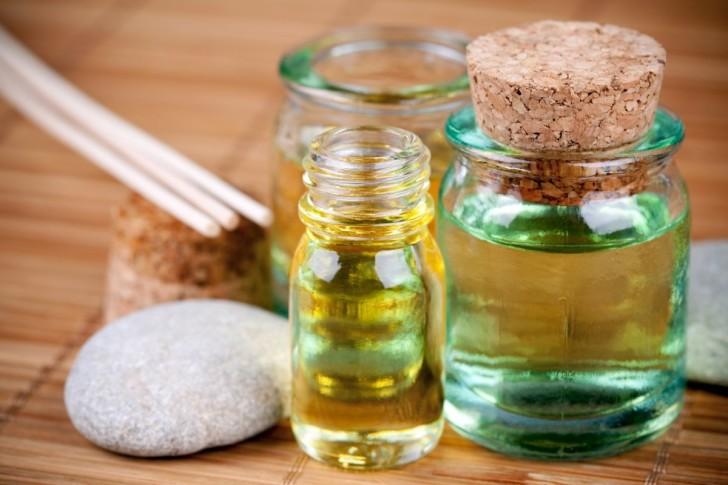
Camphor oil helps regenerate breast tissue and prevent the appearance of lumps
In addition to wrapping, you can resort to other folk methods to quickly stop lactation - applying cold cabbage leaves to your chest and changing them every hour throughout the day. According to Jack Newman, a well-known breastfeeding consultant, the use of cabbage is a fairly gentle way to relieve engorgement of the mammary glands (to avoid the development of lactostasis).
Sometimes, to stop lactation, the use of special herbal preparations is quite justified. Such infusions or decoctions can be taken either internally or as a rub. The most widely used diuretic infusions include a herbal decoction of sage and mint.
We suggest you read: Why does a wife get nervous after childbirth?
For a more effective effect of herbal decoctions, you should simultaneously reduce your body's fluid intake. Significantly reducing the amount of fluid you drink helps naturally reduce your milk supply and helps completely suppress prolactin production. Due to this, taking herbal infusions gives the desired result.
The minimal harm to the body from herbal preparations is a big plus in their favor. As a precaution, before you start using them, it is advisable to consult with a specialist, since herbal preparations that are used to stop lactation have certain properties:
- diuretics;
- anti-inflammatory;
- sedative.
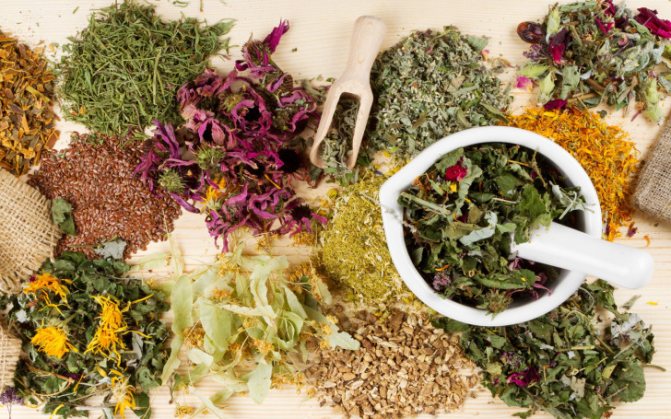
For example, collecting from lingonberry leaves, horsetail, corn silk, elecampane, common basil and bearberry helps get rid of excess fluid in the body, which is known , helps suppress lactation.
Medicinal sage in combination with mint and belladonna can have an anti-inflammatory effect against the background of a reduction in milk supply. Common heather, marsh grass and the roots of valerian officinalis are indispensable in stressful situations.
Below are several recommended recipes for herbal infusions that suppress lactation:
- Chopped sage leaves - 1 tsp. pour 200 ml of boiling water. Leave for about an hour, then strain. Take 50 ml 4 times a day 20 minutes before meals.
- Mint leaves - 5 tsp. pour 300 ml of boiling water. Leave for an hour and strain. Drink 100 ml three times a day.
- Lingonberry leaf - 1 tsp. pour 200 ml of boiling water, leave for half an hour, drink a third of a glass 3 times a day.

You can buy it at a pharmacy that sells medicinal herbs. Naturally, a noticeable effect from any kind of folk remedies at home does not occur as immediately as from using medications, but already a week after starting treatment, a woman can feel changes in the amount of milk produced.
There are a sufficient number of tablets specifically designed to suppress lactation, which can be purchased at the pharmacy, for example, Dostinex, Bromocriptine, Norkolut, etc. When resorting to their help, it is worth remembering:
- Only a doctor should prescribe pills that will help stop lactation. This precaution helps to avoid side effects from taking inappropriate medications.
- Hormonal drugs have many contraindications, which must be taken into account before taking them. The drugs should not be taken for hypertension, varicose veins, diabetes, liver and kidney diseases, etc.
- The decision to stop lactation must be final, because after taking medications it is no longer possible to restore prolactin production.
- You should only take pills as a last resort if there is no other solution to the problem.
Homeopathy can also be considered as an option to suppress lactation. A doctor must prescribe homeopathic remedies. The most common of them are Fitolyaka 6 and Apis 3.
Of course, pills are the fastest way to stop lactation, but ending it gradually naturally is the safest option, although it takes several months. It is also better not to rush to try to abruptly stop breastfeeding, as this can lead to various complications.
How to stop lactation and which method to resort to is best decided together with a gynecologist. Such a consultation has a number of advantages:
- no unpleasant consequences;
- preventing complications;
- maintaining normal functions of the mammary glands, which plays an important role in preventing tumors and breastfeeding without difficulties next time.
A habit does not appear instantly. Take care of your baby’s health, while not forgetting about your own body.
Women often have to face the inability to breastfeed their children. Some people cannot do this because of their health condition, and sometimes the baby is too weak and cannot breastfeed on his own.
It is important to reduce lactation, but not to extinguish it completely, so that the mother has the opportunity to resume breastfeeding when she regains strength. How to do this is the topic of this publication.
The desire to breastfeed a child does not always coincide with the mother’s capabilities. Sometimes this is not possible due to her illness or the child herself. It is also necessary to stop lactation quickly and safely if the baby is stillborn. For this purpose, medicinal methods are used.

In the first few days, a woman produces colostrum. Only on the third day does milk come. Due to the fact that milk is not removed from the breast, the woman begins to experience pain, redness, and a rise in temperature. Complete extinction is possible only after two weeks.
I give the following recommendations on how to stop breast milk lactation correctly after the birth of a child:
- A woman must wear a tight bra. It should not compress the chest too much, but it should be able to maintain its shape well.
- At home, apply cold compresses to the chest.
- An excess of milk should not be allowed. If it becomes too much, you need to pump a little.
- In order to relieve pain, you can take paracetamol-based medications.
We suggest you read: How to improve relationships with a girl after a quarrel
It is impossible to quickly stop lactation. To do this correctly, you will need to achieve a gradual decrease in lactation.
The end of breastfeeding should be gentle for both mother and baby. The main thing is not to cause great harm to the baby. The mother should be as attentive as possible during this period and devote as much time as possible to the child.








